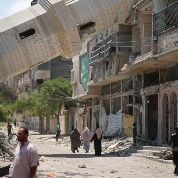Israel pulled its settlers and troops out of the Gaza Strip in 2005. In 2006, Hamas won, in free and fair elections, the majority of the Palestinian legislature. In response to the Palestinian people's democratic choice, Israel and the Quartet of the Middle East, which consists of the U.S., E.U., Russia, and the U.N. approved of and imposed economic sanctions against the Palestinian National Authority. In the face of these sanctions, the Palestinian Legislative Council created a national unity government, in March 2007.

RELATED: Daily Life in Gaza Under the Israeli Blockade
In June 2007, during the Battle of Gaza, between Hamas and Fatah, Hamas was pushed out of the West Bank and cordoned into the Gaza Strip. Fatah took over the West Bank. Israel and Egypt then implemented a blockade against Gaza, allowing almost no goods or people to enter or leave Gaza. Egypt argued that it could not open the Rafah border crossing because doing so would mean legitimizing Hamas's control of Gaza.
In September 2007, the Israeli cabinet decided to strengthen the material limitations on the Gaza people stating, "the movement of goods into the Gaza Strip will be restricted; the supply of gas and electricity will be reduced; and restrictions will be imposed on the movement of people from the Strip and to it."
RELATED: Gaza's Minority Christian Community Suffering Under Occupation
In 2012, an Israeli court ordered Israel's Coordinator of Government Activities in the Territories (COGAT) to reveal publicly a document that calculated the minimum number of calories necessary to keep Gazans from severe malnutrition and the number of truckloads that should be sent into Gaza to keep them on the edge of starvation. In fact the number of truckloads that Israel allows into Gaza is even less than calculated in the document.
Not only has Israel, the U.S., and European countries denied Palestine the right to exist and the right to basic resources, Arab governments and leaders who publicly make a rhetorical show of critiquing Israel and supporting Palestinian liberation, have often refused to deliver on their promises of material support to Palestine, so Palestinian civil society is left having to fend for itself while barely able to provide for itself. For example in 2010, the Arab summit promised 500 million dollars to Palestinian Jerusalem, but actually delivered a mere 35 million. And in 2012, after Israel refused to pay the 100 million dollars that is part of its legal financial obligation to the State of Palestine, the Arab League agreed to compensate Palestine that 100 million dollars, but the Arab states never did so.
To this day, Israel maintains strict control over Gaza airspace and territorial waters, imprisoning over a one-and-a-half million people on a strip of land 25 miles long. Even though Israel claims it no longer occupies Gaza, under international law, it is still considered the occupying force, through its blockade, thus, it is, responsible for the welfare of all Palestinians living in the West Bank and Gaza.
In late May, 2010, six ships, called the Gaza Freedom Flotilla, which was organized primarily by the Free Gaza Movement and the Foundation for Human Rights and Freedom and Humanitarian Relief in Turkey was attempting to bring 10,000 tons of humanitarian aid to Gaza and break the blockade against Gaza. The Israeli military attacked the ships from speedboats and helicopters and killed nine activists that night. Among other goods, the ships carried food, toys, electricity generators, medicines, medical equipment, cash, and building materials, all of which is illegal under the Israeli blockade. Because of the Israeli blockade, Gaza often cannot receive basic goods, thus most of the manufacturing industry is closed, unemployment in 2013 was at nearly 40 percent, and 65 percent of children in Gaza are food insecure.
